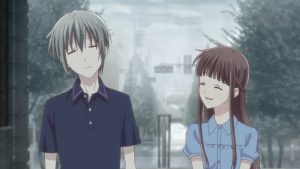 After a side-story that never made it into the first anime (which was inexplicably padded out to two episodes) Fruits Basket 2019 returns to core material this week. In fact this episode featured the introduction of a rather important Sohma. I must confess, though, that I felt considerably less invested in what was happening than I remember feeling when I watched this chapter adapted the first time. And that fact joins a list of things that are starting to worry me quite a bit about this version of Furuba.
After a side-story that never made it into the first anime (which was inexplicably padded out to two episodes) Fruits Basket 2019 returns to core material this week. In fact this episode featured the introduction of a rather important Sohma. I must confess, though, that I felt considerably less invested in what was happening than I remember feeling when I watched this chapter adapted the first time. And that fact joins a list of things that are starting to worry me quite a bit about this version of Furuba.
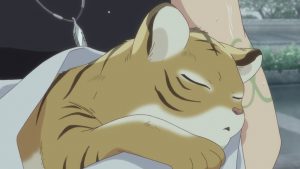 Am I losing the plot here? I hope not, as there’s still a lot of stuff coming up that I was very swept up in, both with the first anime and in reading the manga. But the introduction of Kisa (Ueda Reina) really should have packed more of a punch than it did. Was it this saccharine and trite the first time? I’ve had occasion to wonder “it it me that’s changed?” with reboots of older series before, to be sure (including this one), but I still can’t shake the feeling that this sequence of events (like many others) was handled with a lighter touch the first time around.
Am I losing the plot here? I hope not, as there’s still a lot of stuff coming up that I was very swept up in, both with the first anime and in reading the manga. But the introduction of Kisa (Ueda Reina) really should have packed more of a punch than it did. Was it this saccharine and trite the first time? I’ve had occasion to wonder “it it me that’s changed?” with reboots of older series before, to be sure (including this one), but I still can’t shake the feeling that this sequence of events (like many others) was handled with a lighter touch the first time around.
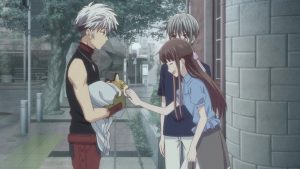 Part of the issue, I think, is that Kisa really only works as part of a tandem. The weight of her arc really kicks in when the other half of that tandem is introduced (which I guess will happen in about 3 or 4 weeks). On her own Kisa’s story is pretty one-note – showing us an adorable little girl (and tiger) who refuses to talk because she’s being bullied is pretty low-hanging fruit from a narrative standpoint. There’s a push-button quality to the drama here, one that Furuba in all its incarnations can be susceptible to in its weaker passages. Once Kisa’s “other half” turns up, her arc (which is really their arc) gets much more nuanced and tonally diverse.
Part of the issue, I think, is that Kisa really only works as part of a tandem. The weight of her arc really kicks in when the other half of that tandem is introduced (which I guess will happen in about 3 or 4 weeks). On her own Kisa’s story is pretty one-note – showing us an adorable little girl (and tiger) who refuses to talk because she’s being bullied is pretty low-hanging fruit from a narrative standpoint. There’s a push-button quality to the drama here, one that Furuba in all its incarnations can be susceptible to in its weaker passages. Once Kisa’s “other half” turns up, her arc (which is really their arc) gets much more nuanced and tonally diverse.
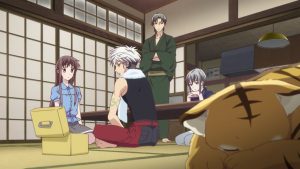 For now, we get lots of subtle-as-a-sledgehammer shots of Kisa looking sad (both as a human and tiger cub) and glomping onto Tohru, all set to insistent string-based BGM. There’s also a connection to Yuki’s past – he too stopped speaking for a while – which probably isn’t helped by the fact that I find him to be kind of a chore a lot of the time anyway. All in all it’s another lost episode for me, which makes three in a row, and that’s a lot for a series to overcome. Sometimes when you drift away for that long it’s very hard to re-establish the connection, but I sincerely hope that’s not the case here with me – I really want to feel some of those later chapters the way I remember feeling them, long ago.
For now, we get lots of subtle-as-a-sledgehammer shots of Kisa looking sad (both as a human and tiger cub) and glomping onto Tohru, all set to insistent string-based BGM. There’s also a connection to Yuki’s past – he too stopped speaking for a while – which probably isn’t helped by the fact that I find him to be kind of a chore a lot of the time anyway. All in all it’s another lost episode for me, which makes three in a row, and that’s a lot for a series to overcome. Sometimes when you drift away for that long it’s very hard to re-establish the connection, but I sincerely hope that’s not the case here with me – I really want to feel some of those later chapters the way I remember feeling them, long ago.


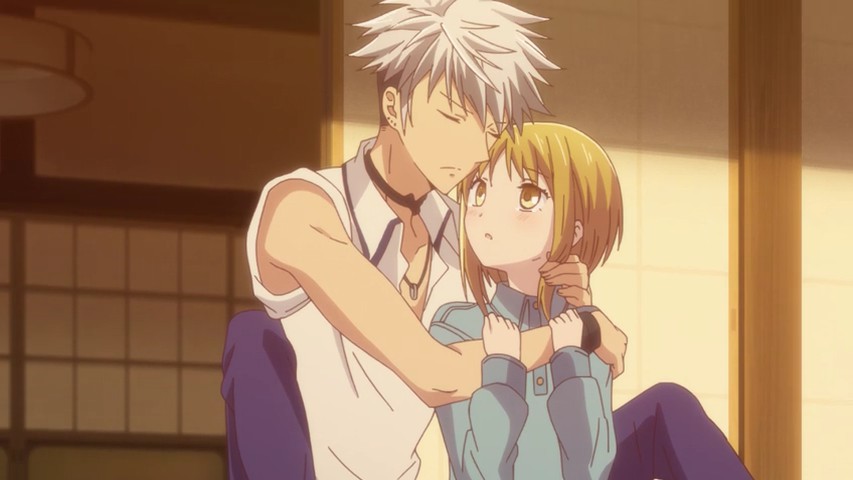
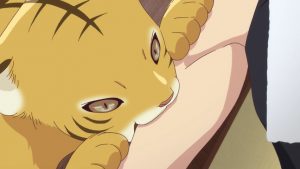
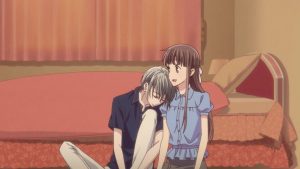
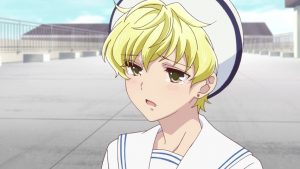
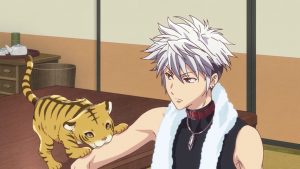
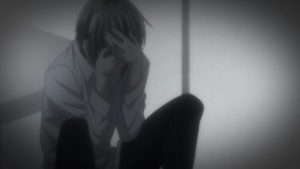
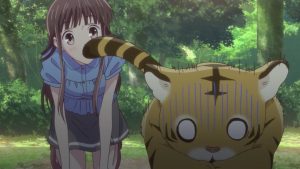
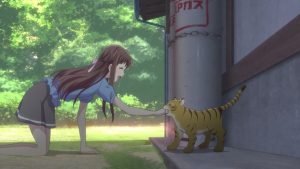
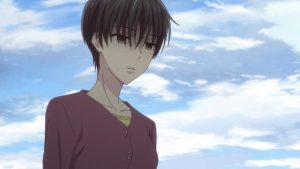
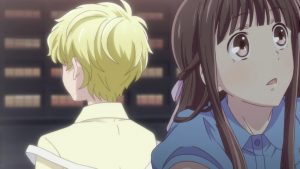
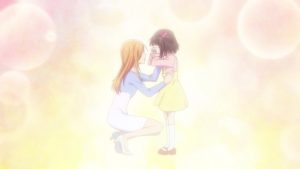
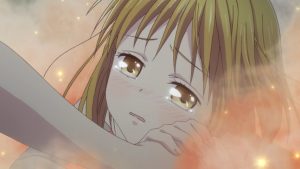
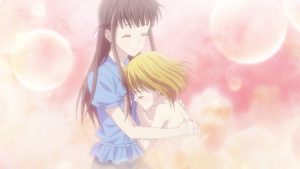
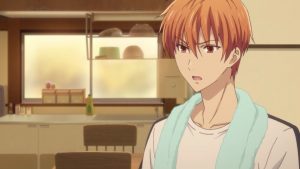
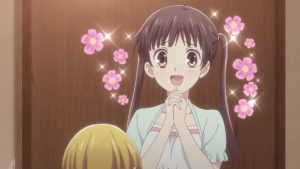
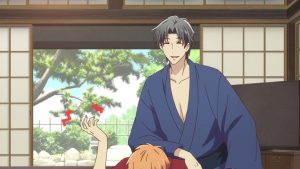
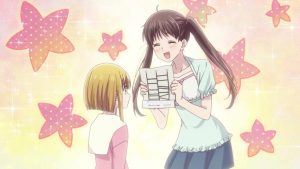
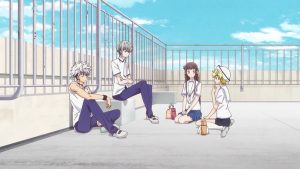
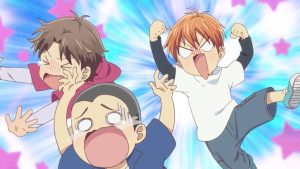
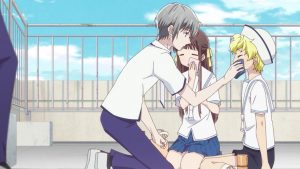
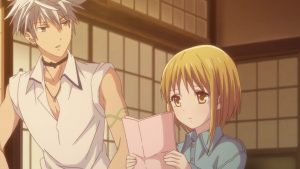
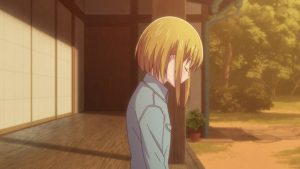
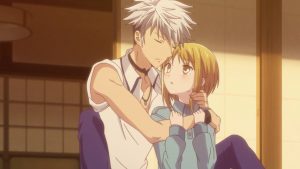
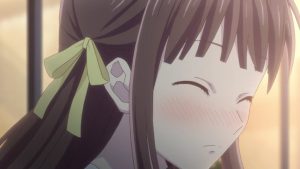
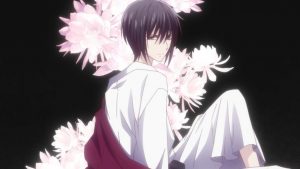
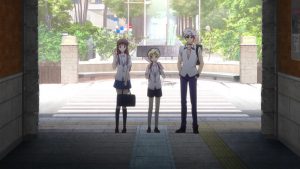
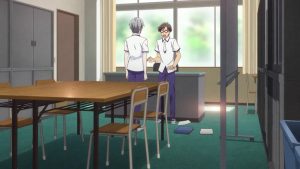
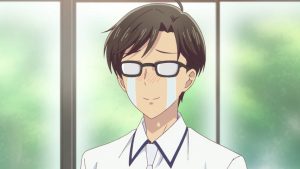


Gracie
August 3, 2019 at 8:48 pmI liked this episode and Kisa in particular. Her pair, not so much. It’s basically a frame by frame of the original with some added scenes concerning Yuki, maybe.
leongsh
August 4, 2019 at 9:50 pmI find myself being detached from the show and its characters. It’s a soap opera that flits between mundane and beats-you-over-the-head “cry, dammit, cry” melodrama. There’s a few shows broadcast on Friday evenings/Saturday early mornings that I am watching and it’s the lowest on my priority – lower than Araburu Kisetsu no Otome-domo yo and only because I wanted to see how the girls continue to self-sabotage themselves.
Kim
August 5, 2019 at 9:22 amI am still enjoying Fruits Basket and while I know it’s emotionally manipulative and saccharine it still
makes me feel. I do remember the first series and the manga for that matter feeling darker than this series though . I don’t know exactly what is missing because the material is the same so it must be the direction or even just music placement. I do miss that darkness. It was a good Contrast with the cuteness and that is actually what made me fall for Fruits Basket in the first place.
What I do like about this series is the characters are still really well developed. I feel you get to know them slowly and every character gets ample development. And watching this series has brought back my love for every character. For example I did not dislike the two Uo chapters last week. I like that she isn’t just Tohru’s sidekick friend but we got to see why she is so close to Tohru. And I imagine we will get Saki’s story too. I also like all the moments between the characters like the ones between Yuki, Hatsuharu and Kisa in this ep or Yuki, Tohru, Momiji, and Hatsuharu eating lunch together. I don’t know those moments help them feel more “real” to me.
Also I feel there is some interesting foreshadowing in this ep that I certainly didn’t pick up on when reading the manga.
aggies11
August 8, 2019 at 10:04 pmI really like your idea that an adaptation highlights the goodparts of a work, and then putties over the cracks. Many people keep mentioning the saccharine nature of FruBa, and how it’s often over the top. I think that’s fairly accurate. That doesn’t make it bad, it just means in order for it to “work”, for it not to feel rote, uninspired or cookie cutter, it really comes down to balance and pacing. If you just lay it out all bare, I don’t think it works, or rather it suffers all the above criticisms. For whatever reason, I feel the original Anime somehow, almost magically, stumbled into that pacing. It would disarm you with the slapstick goofball comedy antics, only then to catch you off guard and hit with some emotional melodrama. I guess all the sadness goes down better if you were just previously smiling? Neither would stick around for too long to risk close scrutiny, and you were just funneled towards the next story beat.
I’m immediately reminded of the Hatori back story episode, one that is incredibly sad, almost depressingly so, and yet I recall little things like Tohru being clumsy, and tripping down the stairs, breaking up the tension, and providing a much needed dose of cute sillyness. Endearing the characters to you, which in a way both makes their emotional struggles seem that much more powerful, but yet also strangely more palatable?
I keep coming back to this remake mostly out of curiosity. I never read the Manga (Anime is more my preference) and when the original FruBa ended, I was really left wanting more and feeling that it ended too soon. So the promise of more story is incredibly enticing, and also seeing how this new adaptation is different. What I might be learning about myself though, is that apparently it wasn’t just the story I was interested in, but that apparently tricky blend of humor, sadness, empathy and triumph that the original series somehow captured. Without all that, just the plain story details just aren’t nearly as compelling. Still, it’s a very interesting experience, and I’ll certainly stick with it for the initial run/season, but not sure I will continue after that as my curiosity might be sated by then.
Guardian Enzo
August 8, 2019 at 10:40 pmGreat comment, thanks. I would add that I don’t think the original stumbled into its success at all – it had probably the most accomplished director of this sort of material in anime history in Akitarou Daichi. It may not have pleased the mangaka but I personally believe it elevated the material considerably.